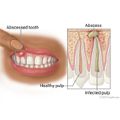Condition Basics
What is an abscessed tooth?
An abscessed tooth is an infection in or around the tooth. It can be very painful. If the infection isn't treated right away, it can spread and you can lose your tooth or have other health problems.
What causes it?
Damage to the tooth, an untreated cavity (tooth decay), or gum disease can cause an abscessed tooth.
An abscess forms around a tooth when pus can't drain. A pocket of pus forms around a tooth when the body tries to fight an infection caused by bacteria.
What are the symptoms?
When you have an abscessed tooth, you may have:
- Throbbing pain, especially when you chew.
- Red, swollen gums.
- A bad taste in your mouth.
- Swelling in your jaw or face.
- A fever.
- A red, swollen bump in your mouth. It may have blood or pus oozing from it.
- A tooth that is very tender or sore to the touch.
Over time as the infection spreads, the bone in your jaw may start to dissolve. When this happens, you may feel less pain, but the infection will still be there. If you lose too much bone, your tooth will become loose and may have to be removed.
How is it diagnosed?
Your dentist will ask about your symptoms and look for swelling and other signs of infection in your mouth. Your dentist may tap on the tooth and apply heat or cold to the tooth. Your dentist may also take dental X-rays.
How is an abscessed tooth treated?
An abscessed tooth needs treatment right away. You and your dentist will decide what's right for you. Your dentist may:
- Give you antibiotics to kill the bacteria causing the infection.
- Make a hole in the tooth to drain the infection and relieve the pain.
- Do a root canal to remove the infected pulp in the tooth.
- Remove the tooth. This may be needed if you don't want a root canal, or if you have one and it doesn't work.
How can you prevent it?
The best way to prevent an abscessed tooth is to take good care of your teeth and gums:
- Brush your teeth 2 times a day, in the morning and at night. Use fluoride toothpaste.
- Use dental floss to clean between your teeth every day.
- See your dentist for regular dental cleanings and checkups.
- Eat a healthy diet, avoid sugary foods and drinks, and limit between-meal snacks.
- Avoid having a dry mouth. It can put you at risk for cavities and infections.
Credits
Current as of: July 31, 2024
Current as of: July 31, 2024





